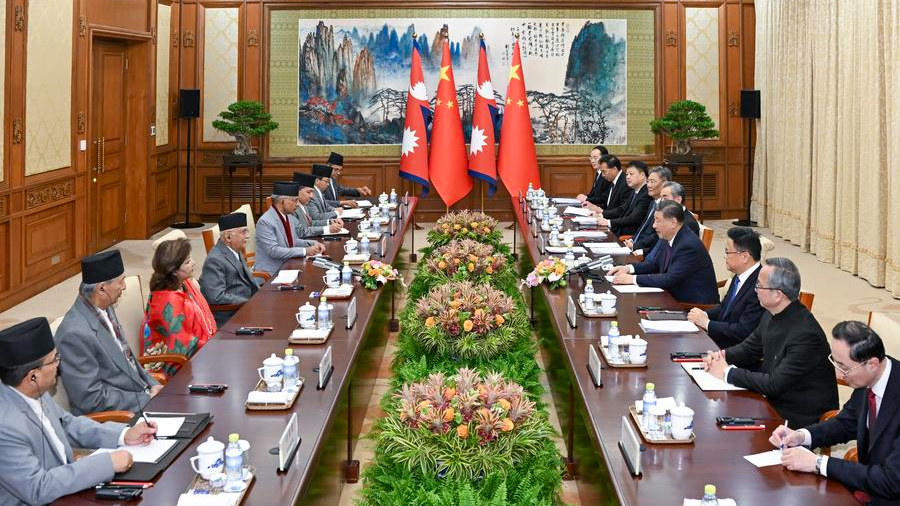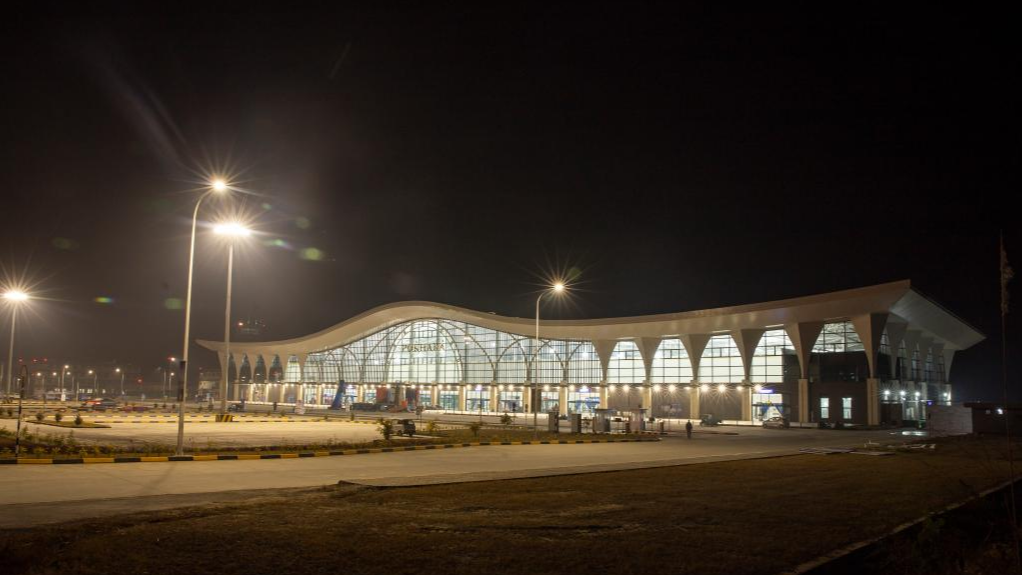By Ibrahim Khalil Ahasan

Chinese President Xi Jinping meets with Nepali Prime Minister KP Sharma Oli, who is on an official visit to China, at the Diaoyutai State Guesthouse in Beijing, capital of China, December 3, 2024. [Photo/Xinhua]
Nepali Prime Minister KP Sharma Oli's China visit carries great significance for both trans-Himalayan economic cooperation, and China's neighborhood diplomacy and peaceful coexistence. During a meeting between President Xi Jinping and Nepali Prime Minister Oli on December 3, both leaders committed to working to strengthen their strategic partnerships. President Xi said that China places Nepal in an important position in its neighborhood diplomacy, and is willing to work with Nepal to consolidate traditional friendship and push for new progress in advancing the China-Nepal strategic partnership of cooperation featuring ever-lasting friendship for development and prosperity, pointing out that next year will mark the 70th anniversary of the establishment of diplomatic relations.
The two nations' shared history, long-standing relationship, linked mountains and rivers, similar goals for modernization and prosperity, and shared cultural heritage all serve as crucial pillars for their expanding strategic, trade and economic cooperation. Peace, prosperity and progress in the region gets a strong boost from Nepal's reaffirmation of the one-China principle and its prohibition of any force using its territory for anti-Chinese purposes.
The visit significantly deepens their engagement in a variety of topics and priorities. The signing of nine agreements ranging from infrastructure to trade cooperation has elevated bilateral ties to an unprecedented level, reflecting China's commitment to building a closer China-Nepal community with a shared future. A joint statement between China and Nepal has been issued, emphasizing the two countries' dedication to strengthening coordination and promoting high-quality cooperation. China is set to provide $20 million budgetary support and $41 million economic and technical assistance to Nepal.
From power grids to people-to-people exchanges, areas of mutual interests for both China and Nepal will keep the nations working to advance Nepal's socioeconomic development. Pokhara International Airport, Nepal's "national pride project," is a monument to joint construction of the Belt and Road Initiative (BRI) between China and Nepal.

Pokhara International Airport is pictured in Pokhara, Nepal, December 31, 2022. [Photo/Xinhua]
The tourism industry accounts for almost 8 percent of Nepal's GDP and supports over 1.2 million jobs. China's strong support in announcing 2025 as the "Visit Nepal Year in China" will aid Nepal in achieving its strategic objectives of drawing 2 million foreign visitors by 2025, which will not only help the country's tourism industry recover but also increase people-to-people interactions.
China is further positioned as a trustworthy partner for Nepal, helping Nepal to develop from a landlocked country to a land-linked country via connectivity projects while promoting sustainable economic growth, thanks to China's achievements in high-quality sustainable economic development, its modernization drive, and connectivity projects like the BRI and Global Development Initiative.
Nepal has a wealth of hydroelectric power production potential. Collaboration in the areas of green energy transition, hydroelectricity generation, climate cooperation and ecological conservation is crucial not only for Nepal's hydro-electricity self-sufficiency and trade efficiency but also its long-term strategy for net-zero emissions by 2045, and trans-Himalayan climate cooperation.
The bilateral trade between China and Nepal reached 12.69 billion yuan (about $1.78 billion) in 2023, an increase of 15.6 percent year on year. Of these, commerce between Nepal and China's Xizang Autonomous Region was valued at 2.77 billion yuan. In May, 2024, 14 traditional China-Nepal border trade points were fully resumed. In order to witness China's efforts in furthering its reform and opening-up and to look for economic opportunities, Oli's delegation consists of 48 representatives from the private sector.
As one of the least developed countries that has established diplomatic relations with China, Nepal will benefit from China's implementation of zero-tariff treatment for 100 percent tariff lines starting from December 1. The generosity will help Nepal boost its trade with China, allowing more Nepalese specialty products to enter the Chinese market, such as tea from Nepal's high-altitude tea gardens, organic foods, fruit, vegetables and dairy products.
While several Indian media outlets have exaggerated that Oli's first foreign trip to China after taking office defied custom by going to China rather than India, his trip doesn't target any third parties. By eschewing the regional geopolitical competition between big powers, Nepal now puts its own national development requirements first.
The author is a special commentator on current affairs for CGTN.

 中文
中文



